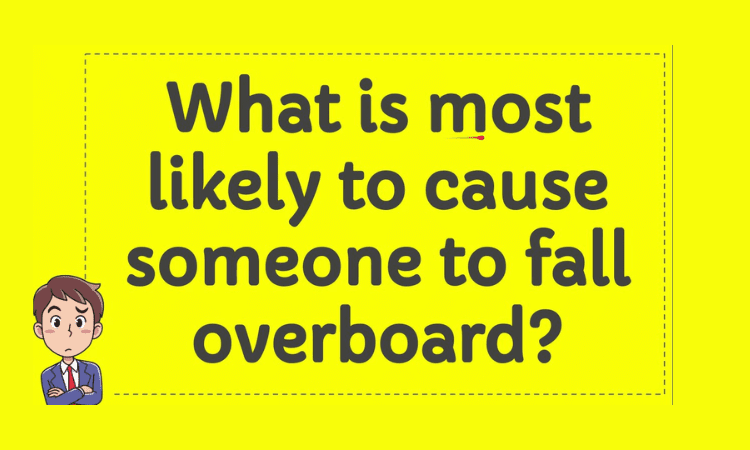Envision yourself on a boat, gliding along the ocean and taking in the fresh air and sunshine. But have you ever considered what would finally send a person over the edge? We will investigate the different circumstances and causes of these disasters in this piece, delivering vital knowledge to keep you safe when boating.
Unsteady Traction
One of the most common reasons for falling overboard is shaky footing. It could be caused by anything as simple as an unexpected wave or something as complex as uneven ground. Maintaining a steady and secure attitude is essential while in transit.
- Wet or spilled drinks can make even the most recently swept deck hazardous. Accidents can be avoided with the help of well-fitting shoes and non-slip flooring.
- Floor Unevenness: Boat motion can cause the flooring to become uneven. Take care not to lose your balance when walking, and grab onto railings or other solid objects if necessary.
Uneven Weather
When the weather is bad, people are more likely to lose their footing and go overboard. It might be challenging to maintain your balance in rough seas, strong winds, and tall waves.
- Strong waves might come out of nowhere and toss passengers around. When the seas are choppy, it’s safer to stay indoors or cling to railings.
- Strong winds can easily knock individuals off balance, so holding on to railings or other secure objects is essential.
Lack of Precautionary Measures
In many cases, people go too far because they failed to take basic safety measures. Wearing life jackets, using lifelines, and following safety protocols can help prevent accidents.
The failure to don a life jacket is a common faux pas. Wear a correctly fitting life jacket at all times and keep one handy.
These are your lifelines, and they will prevent you from drowning. In extreme circumstances, using them could mean the difference between life and death.
Failure to Focus Due to Distractions
- Distractions and lapses in concentration can lead to mishaps. Keep your wits about you when enjoying the ocean.
- Is your cell phone a source of distraction? This could increase the likelihood of you becoming dizzy.
- Long conversations might also distract you from your surroundings and put you at risk of an accident.
- Alcohol: Alcohol is a big factor in falls overboard because it impairs judgment and coordination.
Diseases and Illnesses
Some medical conditions can increase the risk of drowning. Convulsions, dizziness, and other medical issues can increase the risk of accidental injury.
- Seizures: Individuals who have experienced seizures in the past have to exercise additional caution and keep away from situations where they could fall into the water.
- Being lightheaded might make it difficult to maintain equilibrium on a moving boat.
- Medication: be aware that some medicines have side effects that can make it difficult to maintain balance and coordination.
Quick, Unexpected Moves
People might easily lose their balance while boating because of the many different maneuvers that are required, such as unexpected stops or quick turns.
- Sharp Turns: Changing course suddenly can catch passengers off guard.
- Stopping Suddenly: Passengers could be thrown off balance by a sudden stop.
- To lessen these dangers, it is essential to hold on to railings or secure oneself during maneuvers.

Overpopulation
When there are too many people on a boat, accidents like people going overboard become more likely. When there are too many passengers, maintaining order becomes more of a challenge.
- Crowded conditions increase the likelihood of accidents like slips and trips due to the inability to move freely.
- Unbalanced Loading: In turbulent waters, uneven loading might cause the boat to capsize.
- Boat captains need to be mindful of passenger limitations to ensure everyone has a good time.
Unacceptable Behaviour
- Carelessness or unethical behavior on board might potentially lead to an individual falling overboard. Horseplay, climbing to precarious heights, and leaning too far over the railings are all highly risky activities.
- Accidental falls might happen if you lean over railings too far in an effort to get a better view.
- Roughhousing and horseplay are dangerous since passengers can easily lose their footing and go overboard.
Poor Management and Leadership
- When children or inexperienced sailors are aboard, extra monitoring is always necessary. Accidents are more likely to occur when passengers are careless or lack the necessary skills.
- Children should be under continual supervision to prevent them from wandering off to potentially dangerous areas.
- People Without Much Boating Experience: People without much boating experience may not know how to react in certain situations or notice potential hazards.
- Boat captains and experienced passengers should be in charge of providing direction and keeping an eye on things.
Adverse Environmental Circumstances
- Going overboard is more possible when conditions like fog, rain, or darkness reduce visibility.
- Misjudgments in movement are more likely to occur in foggy conditions because of the reduced visibility.
- Wet floors might make people even more unsteady on their feet.
- Navigating in the dark might be risky if you aren’t prepared for it.
Conclusion:
In conclusion, being aware of the potential causes of a person going overboard is crucial for a fun and safe day on the water. Possible causes include incoordination, bad weather, neglecting safety measures, being distracted, or having a preexisting medical condition. Staying alert, following safety rules, and being aware of your surroundings will help you have a pleasant and safe day on the lake. Never forget that when enjoying the open seas, your safety comes first.
For more content like this, visit our website 4 Bloating Stuff,

